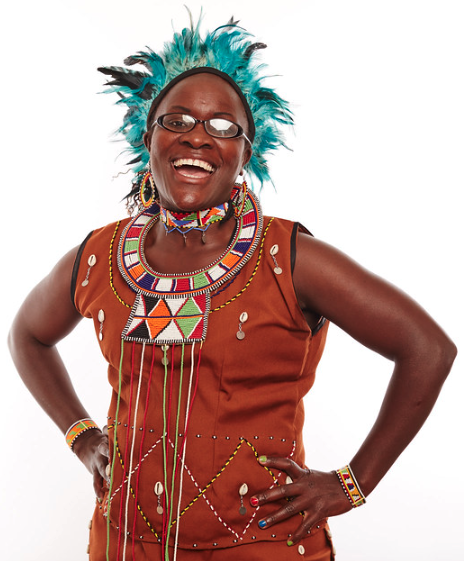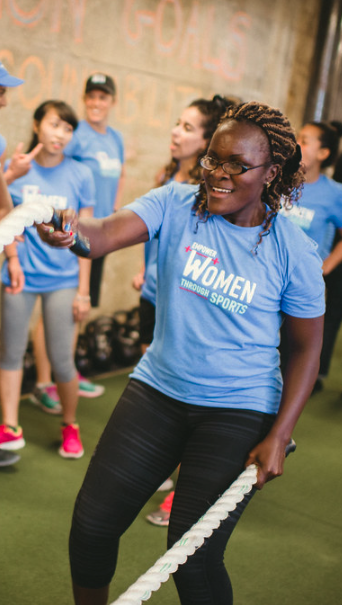
The slums of Kibera in Kenya are not for the faint of heart. Many of its one million inhabitants live on less than one dollar a day, navigate sewage running freely in the streets, and spend the nights of the rainy season trying to stay dry in the shanties that fail to provide even the most basic shelter. “I saw a hopeless generation,” says Veronica Osogo of her first time entering this world just three miles from Downtown Nairobi. Still, Veronica felt compelled to do something for the children here—she decided to regift the best present anyone had ever given her: tennis. From that day on, she carried rackets and balls into Kibera to teach its children to play tennis. “Sports are not money or food, which encourage dependency—they are lifelong skills that empower people to become independent leaders and thinkers.”
“My life has been about sports since I was in primary school,” Veronica says. “I have been privileged to play different sports, such as athletics, hockey, rugby and football.” In 1998, during her second year of university in India, she was introduced to lawn tennis by a friend. She had been completely unaware of it as a real sport and had no idea how to play, but she immediately fell in love with the game. Playing tennis taught her to be patient, to take risks, and to persevere in life. It fulfilled her. In 2000, Veronica graduated from Guru Nunak Dev University in India with a bachelor’s degree in economics, and, two years later, she started playing for Kenya’s National Tennis Team. Playing on the African tennis circuit, Veronica won a number of doubles titles and traveled all around East Africa.

Although Kenya threw off the shackles of colonial rule by declaring its independence from Great Britain in 1963, sweeping societal changes for women did not start taking hold until the 80s and 90s. There were Kenyan women competing in running at the highest levels, but fewer than one in ten of the athletes participating in the Olympics (1988) and the Commonwealth Games (1990) were women. The early 90s began to see a shift toward a more inclusive democracy and an increase in public engagement for women. Kenya’s Women’s National Volleyball Team did much in the 90s to inspire girls and women in sports and pave the way for further acceptance in these roles.
Playing tennis opened many doors for Veronica, and she found that it was a great way to travel locally and internationally, to meet people, and to hone her craft. She never forgot the children of Kibera, and in 2006, she launched the Zion Zone Tennis Foundation. “My dream is to have my own tennis center, a place for the children to come and enjoy themselves.” Veronica also wanted to see the children succeed in other ways, and put a condition on coming to play tennis: if you came to the foundation, you had to go to school. For her work with this population, Veronica won Kenya’s 2009 Sportsperson of the Year award. She also continued to play on the Kenyan National Tennis Team until 2013, playing at her country’s highest level for just over a decade.
In 2014, Veronica was nominated to participate in the Global Sports Mentoring Program (GSMP). She traveled to St. Petersburg, Florida to the headquarters of the world’s largest women’s sports federation—the Women’s Tennis Association (WTA). There, she was mentored by Kathryn Chappetto, Director of Partnerships, and Cindy Lupkey, Manager of Global Administration and Projects. The pairing felt like a perfect match, and it was hard to tell who was more excited. Veronica felt as if the program had come into her life at the right moment, and her mentors were just as enthusiastic. “When I first heard Veronica was coming to the WTA, my immediate reaction was complete joy,” said Cindy. Kathryn was equally elated for the partnership and had full confidence in the impact Veronica would achieve; “She is going to create something in her community that has the power to inspire girls in Kenya, and all over the world.”
Kathryn and Cindy lent their marketing, communications, and public relations expertise, working with Veronica to tell her story and find sponsors who believed in her dream. She learned the importance of a three-minute “elevator pitch” for herself and Zion Zone, and how to develop and implement an action plan. “My experience was the best,” Veronica says. “I was exposed to love, care, and teamwork, and became part of a pool of people working together toward a common goal. Also, tennis out there is bigger than I thought!”

Not long after Veronica’s GSMP experience, she was coaching for her sport’s national governing body, the Kenya Lawn Tennis Association, when she led the women’s wheelchair tennis team to qualify for the BNP Paribas World Cup, a very proud moment for Kenya. The following year, she started as a trainer with the Kenya National Tennis Team. This was also the year that Zion Zone first sent one of its children—now a young woman—off to university.
When Veronica began teaching the children of Kibera to play tennis, there were 28 of them, and her long-term dream was to “establish this program in different slums and reach more children.” Now, more than one thousand children are involved, and the top-ranked children playing tennis in Kenya hail from Zion Zone. The foundation’s programs have expanded to a number of schools, and there is now a branch in another of Nairobi’s most desperate slums—Mathare. Zion Zone has expanded to training mentors, working with parents, and running camps, all in an effort to lift up these children and give a voice to this generation. “I met the voiceless,” Veronica says, “and desired to change their lives through the game.” Veronica has kept hope alive in the slums of Nairobi by being herself, pursuing what she loves, and never giving up.